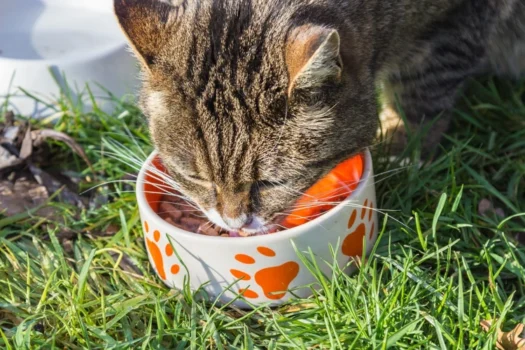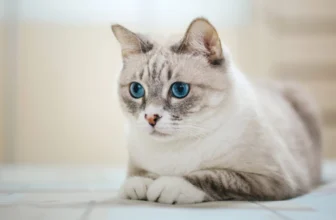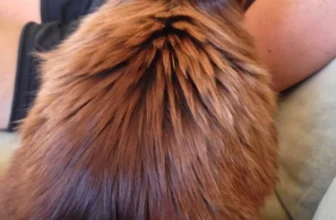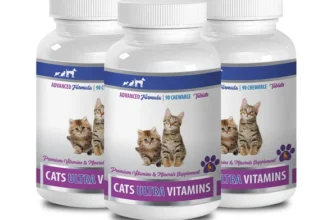As pet owners, we are responsible for providing our furry family members with the best possible nutrition throughout their lives. However, understanding the specific nutritional needs of our pets can be a challenge, especially for a unique breed like the American Wirehair. From kittenhood to senior years, your American Wirehair’s nutritional requirements change as they grow and develop. In this article, we’ll explore the nutritional needs of American Wirehairs throughout their different life stages and provide recommendations for optimal health and wellbeing.
Life Stage 1: Kitten (0-1 Year)
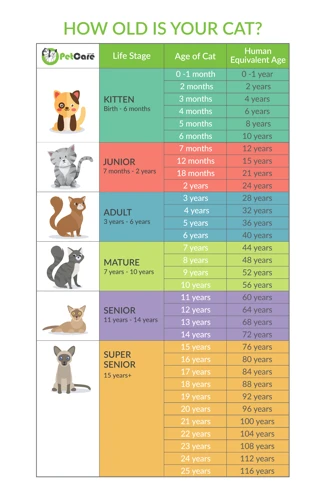
Welcoming a new American Wirehair kitten into your home is an incredibly joyous and exciting time. During the first year of life, your kitten will experience an incredible amount of growth and development. Naturally, these changes also reflect in their nutritional requirements. As their caretaker, it’s essential to ensure that your kitten receives all the necessary nutrients from their diet to grow into a healthy adult. In this section, we’ll explore everything you need to know about feeding your American Wirehair kitten, including different nutritional needs, recommended nutrients, feeding schedules, portions, and common nutritional issues to keep an eye out for. To learn more about feeding schedules and portions, check out our guide on consistent feeding schedules for American Wirehair.
Different Nutritional Needs
Cats, including American Wirehairs, have different nutritional needs throughout their life stages. Proper nutrition is essential for optimal growth and development in kittens, maintaining a healthy weight and body condition in adults, and supporting the aging process in seniors.
Kittens (0-1 Year): Kittens grow rapidly, and their nutritional needs differ from those of adult cats. They require a diet that is high in protein, fat, and calories to support their growth and development. The food should be formulated with essential nutrients, such as omega-3 and omega-6 fatty acids, for healthy brain and vision development, and calcium and phosphorus for strong bones and teeth. It is also crucial to choose a diet that is easy to digest and free of fillers or artificial preservatives.
Adults (1-7 Years): During the adult stage, American Wirehairs require a balanced diet that contains protein, fat, and carbohydrates in the appropriate ratios. This will help to maintain a healthy weight and body condition. The diet should also be rich in vitamins and minerals, such as vitamins A, C, E, and selenium, to support the immune system and keep the cat healthy. It is important to feed adult Wirehairs according to their activity level and body condition, which will help prevent weight gain or loss.
Seniors (7+ Years): As American Wirehairs age, their metabolism slows down, and they become less active. They require fewer calories and may benefit from a diet that is lower in fat and protein and higher in fiber. Senior diets should contain antioxidants, such as vitamins E and C, to support the aging process, and supplements such as glucosamine and chondroitin for joint health. It is also important to monitor food intake and body condition to prevent obesity, which can lead to health problems.
In all life stages, it is important to provide fresh, clean water at all times and to avoid feeding table scraps or human food, which are often high in salt and unhealthy fats. Following these guidelines will help ensure that your American Wirehair receives proper nutrition throughout their life. For more information on feeding, check out our article on American Wirehair kitten and adult feeding tips.
Feeding Schedule and Portions
When it comes to feeding your American Wirehair, it’s crucial to maintain a consistent feeding schedule and portion sizes to ensure your cat is getting the proper nutrition throughout their lifespan.
Feeding Schedule: Your American Wirehair’s feeding schedule will vary depending on their age, lifestyle, and overall health. As a kitten, they’ll need to be fed more frequently, at least three to four times a day, to aid in their growth and development. As they move into the adult stage, they can be fed two to three times a day, and as seniors, they may only need one to two meals a day. It’s important to find a consistent schedule that works for you and your cat and stick to it as much as possible.
Portion Sizes: The amount of food you give your American Wirehair will also depend on their age, weight, and activity level. Overeating can lead to obesity, which can cause a host of health issues. Conversely, underfeeding can cause malnutrition, leading to health problems as well. It’s recommended to measure out your cat’s food using a designated measuring cup or scale to ensure they’re getting the appropriate amount of nutrients and calories.
If you’re unsure about how much to feed your American Wirehair, consult with your veterinarian for guidance and to rule out any underlying medical conditions.
Remember, maintaining a consistent feeding schedule and portion sizes are crucial for your American Wirehair’s overall health and well-being. For more information on Wirehair feeding tips, click here. To learn more about recommended portion sizes for your American Wirehair, visit this page. If you’re curious about the pros and cons of free-feeding, check out this article. Finally, to learn more about the benefits of a Wirehair-specific diet, visit this page.
Recommended Nutrients
Proper nutrition is vital for your American Wirehair’s growth and health throughout their different life stages. Selecting the right diet that caters to their nutritional requirements can be challenging. Here’s a highlight of the recommended nutrients that your feline needs during different life stages to stay healthy:
| Life Stage | Recommended Nutrients |
|---|---|
| Kitten (0-1 Year) | Protein, fat, carbohydrates, vitamins, minerals, DHA, and EPA |
| Adult (1-7 Years) | Protein, fat, carbohydrates, fiber, vitamins, minerals, and water |
| Senior (7+ Years) | Protein, fat, fiber, vitamins, minerals, and supplements like glucosamine and chondroitin to help maintain joint health |
Protein is the essential nutrient that your American Wirehair needs the most. Their diet should contain animal-based proteins like chicken, beef, fish, or turkey. Fat is also vital for their diet as it supplies them with essential fatty acids that help boost their immune system, keep their coat healthy, and regulate their body temperature. Carbohydrates also provide your cat with the needed energy to stay active and healthy.
Vitamins and minerals are also necessary in your cat’s diet. They help their body function correctly and boost their immune system. Ensure that their diet contains Vitamins A, B, C, D, E, and K and minerals like calcium, iron, magnesium, and phosphorus.
Additionally, DHA and EPA are vital nutrients that your kitten requires to support brain and eye development. In contrast, fiber is crucial for maintaining healthy digestion in your adult cat.
Ensure that your American Wirehair’s diet during different life stages contains the recommended nutrients to keep them healthy and energetic. You can consult with your veterinarian to determine the exact nutritional needs of your cat as every cat is different.
Common Nutritional Issues
When it comes to common nutritional issues that American Wirehairs face, there are a few that pet owners should be aware of. Below is a breakdown of these common issues and how to address them:
| Issue | Symptoms | Treatment |
|---|---|---|
| Obesity | Excessive weight gain, difficulty moving, lethargy, increased appetite, joint pain | Reduce portion sizes, switch to a lower calorie cat food, increase exercise and playtime, consult with a veterinarian for a weight loss plan |
| Dental problems | Bad breath, inflamed gums, tooth decay, difficulty eating | Regular dental check-ups, daily tooth brushing, chew toys or dental treats, feeding dry food instead of wet food |
| Food allergies | Itchy or inflamed skin, vomiting, diarrhea, ear infections | Switch to a hypoallergenic cat food, identify and eliminate the allergen from the cat’s diet, consult with a veterinarian for allergy testing and treatment options |
| Urinary tract issues | Difficulty urinating, frequent urination, blood in urine, pain while urinating, excessive licking of genital area | Provide clean water and litter box, switch to a wet food diet, add supplements such as cranberry extract or probiotics, consult with a veterinarian for medical treatment |
It’s important to note that if any of these issues arise, it’s best to consult with a veterinarian for proper diagnosis and treatment. Regular check-ups and preventative care can help to prevent these common nutritional issues from occurring in the first place.
Life Stage 2: Adult (1-7 Years)

As your American Wirehair reaches adulthood, their nutritional needs may change in order to maintain optimal health. It can be perplexing to determine the appropriate feeding schedule, portion sizes, and recommended nutrients for your adult cat. However, understanding these elements can ensure that your feline friend continues to thrive throughout their adult years. Let’s dive into the details of what your American Wirehair needs during their adult life stage.
Different Nutritional Needs
As American Wirehair kittens grow and develop, their nutritional needs change as well. It’s essential to provide them with the right nutrients to allow them to reach their full potential. Here’s a breakdown of their different nutritional needs as they go through different life stages:
| Life Stage | Protein | Fat | Carbohydrates |
|---|---|---|---|
| Kitten (0-1 Year) | 25-30% | 9-15% | 45-65% |
| Adult (1-7 Years) | 26-30% | 12-18% | 30-50% |
| Senior (7+ Years) | 24-28% | 10-15% | 30-45% |
Protein: Growing kittens require more protein than adult cats for their muscular development. Adult cats require a moderate amount of protein to maintain their muscles. Senior cats need less protein to prevent kidney and liver problems.
Fat: Kittens require higher fat intake as they have high energy requirements. However, adult cats require moderate amounts of fat to maintain their weight, and senior cats need lower amounts of fat to prevent obesity.
Carbohydrates: Carbohydrates are an important source of energy for cats, and a moderate amount is necessary for their growth and development. Adult cats require fewer carbohydrates, while senior cats require carbohydrates with low glycemic index to maintain their weight and prevent obesity.
Understanding your American Wirehair’s nutritional needs at different life stages is critical to ensuring their good health and longevity. Providing them with a balanced diet with the right proportion of protein, fat, and carbohydrates can help them lead a healthy life.
Feeding Schedule and Portions
When it comes to feeding your American Wirehair at different life stages, it’s important to establish a consistent feeding schedule and watch the portion sizes. Here’s what you need to know:
Feeding Schedule:
- Kitten (0-1 year): Young kittens need 3-4 small meals a day. As they grow, reduce the frequency to 2-3 meals a day.
- Adult (1-7 years): Adult American Wirehairs should be fed twice a day, preferably in the morning and evening.
- Senior (7+ years): Older cats may have a harder time digesting food, so it’s recommended to feed them 3-4 small meals a day to prevent digestive issues.
Portions:
- Kitten (0-1 year): Kittens have a small stomach, so make sure to provide frequent small meals. The amount of food varies depending on the kitten’s weight and age, so consult with your veterinarian. As a general rule, kittens should eat up to twice their weight in pounds per day split into multiple feedings.
- Adult (1-7 years): Adult American Wirehairs should be fed about ¼ to 1/3 cup of dry food or 4-6 ounces of wet food per day, divided into two meals. Again, this depends on the cat’s weight, activity level, and overall health.
- Senior (7+ years): Senior cats may eat less, but they still need to consume enough nutrients. Give small portions of high-quality, protein-rich food to help maintain muscle mass and support their aging bodies.
Remember, not every American Wirehair has the same nutritional needs, so talk to your veterinarian about your cat’s unique requirements to ensure they receive the proper nutrition they need at each life stage.
Recommended Nutrients
When it comes to understanding your American Wirehair’s nutritional needs throughout different life stages, knowing the recommended nutrients is essential. Here are the essential nutrients your cat needs based on their life stage:
Life Stage 1: Kitten (0-1 Year)
- Protein: Kittens require a high level of protein to support their growth and development. Look for cat food that contains at least 30% protein.
- Fat: Fats are an essential source of energy for kittens. Look for cat food that contains at least 15% fat.
- Calcium: Calcium is important for kitten’s bone development. It is recommended that kitten food contains between 1% and 2% calcium.
- Phosphorus: Phosphorus is also important for kitten’s bone development. Look for kitten food that contains between 0.8% to 1.4% phosphorus.
- DHA: DHA promotes cognitive development and eye health in kittens. Look for cat food that contains DHA supplements.
Life Stage 2: Adult (1-7 Years)
- Protein: Adult cats require a slightly lower level of protein compared to kittens. Look for cat food that contains at least 26% protein.
- Fat: Adult cats require moderate levels of fat. Look for cat food that contains between 9% and 15% fat.
- Fiber: Fiber helps adult cats maintain a healthy weight and prevent hairballs. Look for cat food that contains between 1.5% and 10% fiber.
- Taurine: Taurine is important for adult cats’ heart health and overall wellbeing. Look for cat food that contains taurine supplements.
Life Stage 3: Senior (7+ Years)
- Protein: Senior cats require a higher level of protein to maintain their muscle mass. Look for cat food that contains at least 28% protein.
- Fat: Senior cats require lower levels of fat to maintain their weight. Look for cat food that contains between 4% and 10% fat.
- Phosphorus: Senior cats need lower levels of phosphorus to protect their kidneys. Look for cat food that contains less than 0.8% phosphorus.
- Omega-3 Fatty Acids: Omega-3 fatty acids are important for senior cats’ joint health and cognitive function. Look for cat food that contains omega-3 supplements.
Keep in mind that the recommended nutrients may vary depending on your American Wirehair’s individual health needs and activity level. It is always best to consult with your veterinarian to determine the best cat food and nutritional plan for your furry companion.
Common Nutritional Issues
As with any breed of cat, American Wirehair cats can experience a range of common nutritional issues that owners should be aware of. Proper nutrition is crucial for the health and well-being of your cat. Below is a table that outlines the most common nutritional issues that can affect American Wirehairs, along with their symptoms and potential causes.
| Common Nutritional Issue | Symptoms | Potential Causes |
|---|---|---|
| Obesity | Weight gain, lethargy, difficulty breathing, joint problems | Overfeeding, lack of exercise, poor quality food |
| Urinary Tract Infections (UTIs) | Frequent urination, painful urination, blood in urine | Insufficient water intake, lack of dietary nutrients, feeding low-quality food |
| Diabetes | Increased thirst, increased urination, weight loss, vomiting | Overfeeding, feeding too much carbohydrates, lack of exercise |
| Dental Issues | Bad breath, difficulty chewing, bleeding gums | Feeding only soft food, poor dental hygiene, lack of nutrients in food |
If you suspect your American Wirehair may be experiencing any of the above issues, it is important to consult with your veterinarian. They can help diagnose the problem and create a treatment plan that may include changes to diet and exercise routine. In addition to regular veterinary check-ups, providing your cat with high-quality food and proper nutrition throughout all stages of life can help mitigate the chances of experiencing these common nutritional issues.
Life Stage 3: Senior (7+ Years)
As our beloved American Wirehairs age, their nutritional needs change as their bodies slow down and become less active. It’s important to understand the unique needs of our senior feline friends to ensure they remain healthy and happy in their golden years. With aging comes a higher risk of health issues, but by providing the right nutrients and care, we can help our American Wirehairs thrive during their senior years. Let’s explore their nutritional needs during this life stage.
Different Nutritional Needs
As your American Wirehair cat passes through different life stages, their nutritional needs will change. At each stage, they require a specific balance of nutrients to optimize their health and well-being.
Kitten (0-1 Year)
During the kitten stage, your American Wirehair is growing rapidly and needs more protein, fats, and minerals than at any other stage. Your kitten needs a minimum of 30 percent protein in their diet for proper growth and development. Additionally, their food should contain approximately 20 percent fat to fuel their active lifestyle and provide energy to grow.
Adult (1-7 Years)
As your American Wirehair cat transitions into the adult stage, their nutritional needs change. Now, they need a diet that’s low in fat and calories to maintain a healthy weight. Your cat requires a minimum of 25 percent protein in their diet to maintain lean muscle mass. Depending on the activity level and lifestyle of your American Wirehair, their diet may contain anywhere from 9-15 percent fat.
Senior (7+ Years)
As your American Wirehair cat enters the senior stage of their life, their nutritional needs change once again. They require less protein in their diets to maintain lean muscle mass, and their calorie intake should be reduced as well. Senior cat food should contain approximately 25-30 percent protein and 8-15 percent fat depending on activity level. Additionally, senior American Wirehair cats often experience kidney problems, and their diets may be customized to reflect this.
To make it easier to understand the nutritional needs of your American Wirehair at each life stage, we’ve created the following table:
| Life Stage | Protein Percentage | Fat Percentage |
|---|---|---|
| Kitten (0-1 Year) | 30% | 20% |
| Adult (1-7 Years) | 25% | 9-15% |
| Senior (7+ Years) | 25-30% | 8-15% |
By understanding the unique nutritional requirements of your American Wirehair at each life stage, you can provide them with a diet that meets their specific needs and helps keep them healthy and happy.
Feeding Schedule and Portions
Feeding your American Wirehair with the right amount of food at the right time is crucial for their overall well-being. Here are some feeding schedule and portions recommendations for each life stage:
Kitten:
- From birth to 4 weeks, kittens rely solely on their mother’s milk.
- At 4 weeks, gradually introduce solid food. Offer small portions 4-6 times a day.
- From 8-12 weeks, reduce feedings to 3-4 times a day and increase the amount of food per serving.
- From 12 weeks to 6 months, provide 2-3 meals a day.
It’s important to keep in mind that American Wirehair kittens have high energy needs and require a diet that is high in protein and healthy fats.
Adult:
- Feed your adult American Wirehair 2 meals a day at regular intervals.
- Be mindful of their activity level and body condition when determining portion sizes.
- Each serving should contain protein, carbohydrates, and essential vitamins and minerals.
- Avoid overfeeding as obesity can lead to health issues.
Senior:
- Seniors require a diet that supports their aging bodies.
- Feed them smaller portions, 2-3 times a day, to aid digestion.
- Include high-quality protein, joint-supporting nutrients, and antioxidants in their diet.
- Be sure to consult with your veterinarian as seniors may require special diets to manage health issues such as kidney disease or heart conditions.
Remember to provide your American Wirehair with plenty of fresh water at all life stages. Following a feeding schedule and portion sizes tailored to their needs can help them live a healthy and happy life.
Recommended Nutrients
Your American Wirehair cat requires specific nutrients to maintain a healthy body and fulfill their nutritional needs. As a pet parent, it is essential to include the following nutrients in their diet, according to their life stage:
| Life Stage | Recommended Nutrients |
|---|---|
| Kitten | Protein: Kitten foods should have proteins sourced from animal-based ingredients, such as chicken, beef, or fish. Calcium and phosphorus: These minerals are essential for growth and development of bones and teeth. Vitamins A and D: These vitamins support overall growth and immune function. |
| Adult | Protein: Adult cats require protein to maintain lean muscle mass. Look for foods with high-quality protein sources such as chicken and fish. Fiber: Helps digestion and prevents hairballs. Essential fatty acids: Omega-3 and Omega-6 fatty acids support healthy skin and a shiny, lustrous coat. |
| Senior | Protein: Senior cats need more protein than adult cats to maintain muscle mass. Antioxidants: Vitamins C and E provide important antioxidant support for aging cells. Joint support: Glucosamine and chondroitin support joint health and mobility. |
Remember to always check the label of the cat food you are buying to ensure that it meets the recommended nutrient requirements for your cat’s specific life stage. Providing your American Wirehair with the appropriate nutrients at each stage of life will ensure that they remain happy and healthy for years to come.
Common Nutritional Issues
When it comes to providing nutrition for your American Wirehair cat, it’s essential to understand the common nutritional issues that can arise throughout their different life stages. These issues can vary from digestive problems to obesity.
Here are some common nutritional issues that American Wirehair cats may experience throughout their life stages:
| Nutritional Issue | Description |
|---|---|
| Obesity | Overfeeding and lack of physical activity can lead to obesity in cats, which can increase their risk of developing medical issues such as diabetes and joint problems. Pay attention to your cat’s weight and adjust their feeding portions accordingly. |
| Urinary Tract Problems | A diet that is high in ash or magnesium can increase your cat’s risk of developing urinary tract problems. Ensure that your cat’s diet includes the appropriate balance of nutrients to prevent these issues. |
| Food Allergies | Just like humans, cats can also develop food allergies. Common allergens include dairy, beef, and fish. If you notice your American Wirehair experiencing digestive problems or skin irritations, consult your veterinarian to determine if a food allergy could be the issue. |
| Diabetes | Obesity and a high-carbohydrate diet can increase the likelihood of your cat developing diabetes. Limit the amount of carbohydrates in your cat’s diet and provide them with regular exercise to help prevent this issue. |
| Dental Issues | A lack of dental care and a diet that is high in carbohydrates can lead to dental problems such as tartar build-up, gum disease, and tooth decay. Consider incorporating dental treats into your cat’s diet and schedule regular dental cleanings with your veterinarian. |
By being aware of these common nutritional issues, you can take the necessary steps to prevent them from arising in your American Wirehair cat. Always consult your veterinarian if you notice any changes in your cat’s eating habits or if they are experiencing any health issues.
Conclusion
In conclusion, understanding your American Wirehair’s nutritional needs throughout different life stages is crucial for their overall health and well-being. As kittens, they require a different set of nutrients compared to when they reach adult and senior stages. Providing them with a balanced and nutritious diet, along with a proper feeding schedule and portion control, can help prevent common nutritional issues such as obesity and dental problems. It’s important to pay attention to the ingredients in your cat’s food and ensure that they are getting the recommended nutrients, such as protein, carbohydrates, fats, vitamins, and minerals. As your cat ages, their nutritional needs may change, and it’s important to adjust their diet accordingly. Consulting with your veterinarian and doing proper research on cat food and nutrition can also provide valuable guidance and information. Overall, a healthy and balanced diet plays a crucial role in keeping your American Wirehair happy and healthy throughout their life stages.
Frequently Asked Questions
1. Can American Wirehairs eat human food?
While small portions of human food are typically safe, it’s not recommended to make this a regular habit. Certain foods, such as chocolate or garlic, can be toxic for cats.
2. Should I give my American Wirehair treats?
Treats can be an important part of training and bonding with your cat. Just be sure to limit the quantity and choose treats made from high-quality ingredients.
3. How often should I feed my American Wirehair?
For kittens, it’s recommended to feed small portions several times throughout the day. Adult cats can typically be fed twice a day. Senior cats may require smaller, more frequent meals.
4. How can I tell if my American Wirehair is overweight?
There are a few signs that your cat may be overweight, such as a round belly and difficulty walking or playing. Ask your vet for guidance on monitoring your cat’s weight.
5. Should I choose wet or dry food for my American Wirehair?
Both types of food can meet your cat’s nutritional needs. Wet food may be more appealing for picky eaters and can help with hydration. Dry food is more convenient and can help keep teeth clean.
6. What ingredients should I look for in my cat’s food?
High-quality protein should be the main ingredient, followed by healthy fats and carbohydrates. Look for food with added vitamins and minerals to ensure a complete diet.
7. Can my American Wirehair drink milk?
Cats are lactose intolerant and drinking milk can cause digestive issues. Stick to water and cat-specific beverages.
8. Should I switch my cat’s food often?
It’s not necessary to switch food regularly unless advised by your vet. Some cats may have trouble adjusting to new food and it’s important to maintain consistency for their digestive health.
9. Can I make my American Wirehair’s food at home?
While it is possible to make balanced homemade cat food, it can be difficult to ensure proper nutrition and can be time-consuming. Consult with a vet or veterinary nutritionist before attempting to make your own cat food.
10. Is it important to monitor my American Wirehair’s water intake?
Adequate water intake is important for overall health, especially for cats on a dry food diet. Monitor your cat’s water dish and consider adding a fountain or multiple bowls throughout your home.

